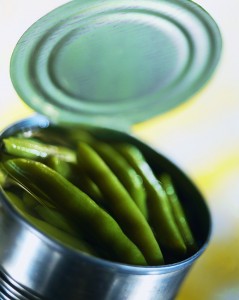“Secret Ingredient”….BPA???
 Thanksgiving is nearly upon us and people everywhere are busily preparing their shopping lists and menus. You may want to reconsider any canned items on your list, in light of this startling news.
Thanksgiving is nearly upon us and people everywhere are busily preparing their shopping lists and menus. You may want to reconsider any canned items on your list, in light of this startling news.
A new test by Consumer Reports has found a wide range of chemical Bisphenol A (BPA) in 19 name-brand canned foods, including soups, vegetables, juices and more. (As an aside, the Vermont legislature will be introducing a bill that bans BPA from certain products...we'll keep you posted.)
BPA, which has been used for years in clear plastic bottles, PVC water pipes, medical equipment, electronics, cash-register receipts and food-can liners, has been linked to reproductive abnormalities and a heightened risk for breast and prostate cancers, diabetes, heart disease, and most recently, sexual function in males.
The study revealed canned green beans and canned soups were among foods with the highest amounts of BPA. Canned Del Monte Fresh Cut Green Beans Blue Lake for example, averaged a BPA level of 123.5 parts per billion, or about 80 times more than what experts recommend you ingest each day.
Organic canned foods aren’t off the hook either—according to the study, organic canned foods did not always have lower BPA levels than their non-organic counterparts. BPA was even found in cans claiming to “BPA-Free".
What you can do this Thanksgiving and throughout the rest of the year to reduce BPA exposure:
- Opt to fresh fruits and vegetables whenever possible. Instead of canned cranberry sauce, make the real thing. Instead of canned corn or green beans, buy them fresh from the grocery store or Farmer’s market. Pumpkin pie puree from a can can be replaced with a real pumpkin. Sure, this homemade process will take longer, but you’ve got time to kill as you wait for that bird to cook! We’ve included some BPA free recipes below.
- If you have to use prepared foods, choose alternative packaging. Although plastic packaging contains detectable amounts of BPA, the levels are significantly lower than the same canned brand item. StarKist Chunk Light canned tuna, for example, averaged 3 ppb of BPA, but BPA levels in the plastic pouch weren’t detectable (but again, we urge to you go fresh whenever possible).
- Use glass containers to heat and store food—Reheating plastic containers or even storing foods in plastics can leach BPA. Choose glass whenever possible.
Here’s wishing you and your loved ones and a safe, happy and BPA-free Thanksgiving.
Homemade Green Bean Casserole Easy and BPA Free Cranberry Sauce BPA-Free Pumpkin Pie
Keep Reading...
Tags: Bisphenol A, BPA, canned food, Consumer Reports, Planned Parenthood of Northern New England, Thanksgiving
